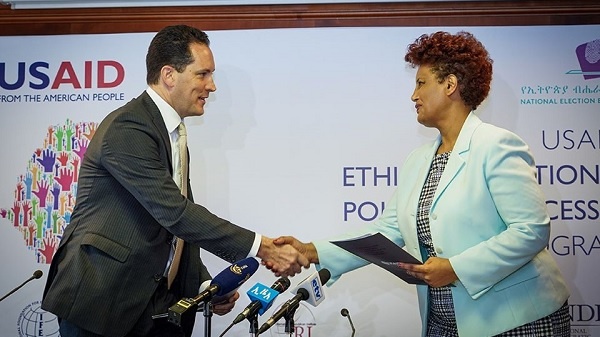
The USAID Ethiopia Election and Political Processes Program will help strengthen the capacity of NEBE officials to organize, administer, and conduct free and fair elections.
ADDIS ABABA (USAID) – The United States and the National Elections Board of Ethiopia (NEBE) signed a memorandum of understanding, on 28 February 2020, for a new $30.4 million program to support the upcoming national elections in Ethiopia. United States Agency for International Development (USAID) Mission Director Sean Jones and NEBE Chairwoman Birtukan Midekssa jointly unveiled the new USAID Ethiopia Election and Political Processes Program, which will help strengthen the capacity of NEBE officials to organize, administer, and conduct free and fair elections.
Under the partnership, U.S. support will utilize technology and leverage the reach of the Ethiopian media to educate the public about elections, while ensuring greater transparency and promoting meaningful participation among all citizens in the political process—with a focus on women, youth, and other traditionally marginalized groups. USAID and its partners will also strengthen the capacity of Ethiopian civil society organizations and political parties to respond to the needs of all Ethiopians more effectively.
“These elections belong to the Ethiopian people, and we are proud to be welcomed as a partner in supporting free and fair elections, and ensuring that the voices of Ethiopians in every corner of the country are heard as this country continues its remarkable journey,” said USAID Ethiopia Mission Director Sean Jones.
- See also: Canada and UNDP sign partnership agreement to support Ethiopia’s upcoming national election
The USAID Ethiopia Election and Political Processes Program is implemented by the Consortium for Election and Political Process Strengthening (CEPPS), which includes the National Democratic Institute for International Affairs (NDI), the International Republican Institute (IRI), Internews, the International Foundation for Electoral Systems (IFES), and the Electoral Institute for Sustainable Democracy in Africa (EISA).
Source: USAID
